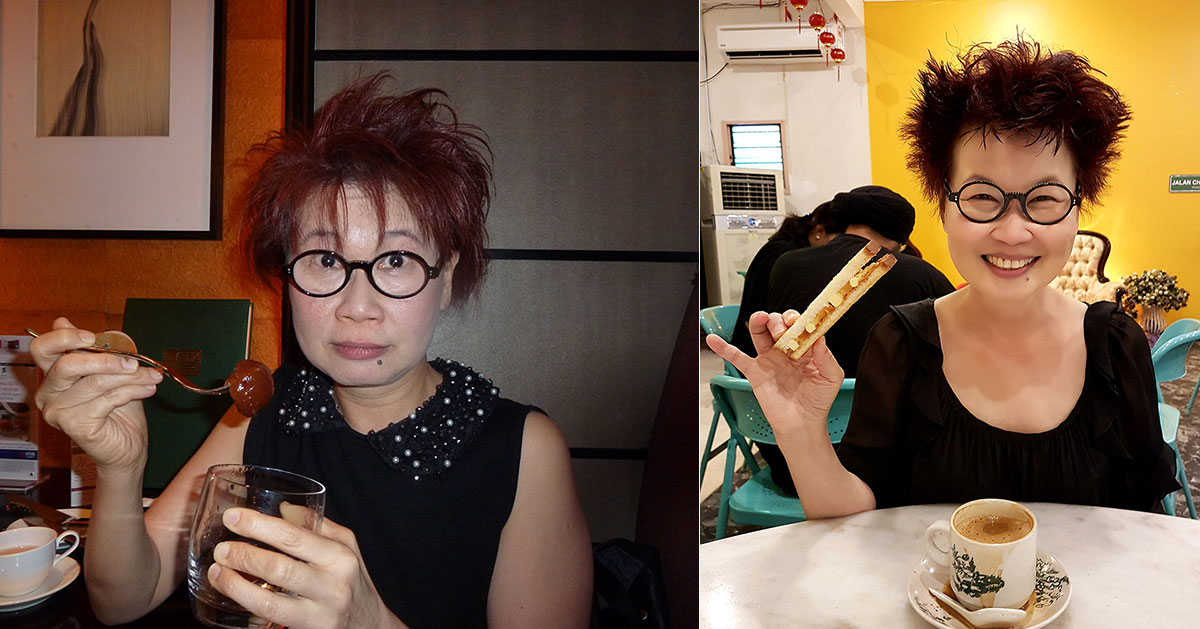She sleeps early, exercises regularly, and never smokes or drinks, yet Chan Sik Mun was diagnosed with Stage 4 non-small cell lung cancer (NSCLC) in November 2014. And she was only age 55.
The dreaded ailment seemingly came out of nowhere and hit the former banker squarely in her chest, and literally took the wind out of her.
Feeling something was wrong
The only hint that something was wrong was how Chan felt winded when she barely even made it up half a flight of stairs to cross the overhead bridge.
This was unusual for someone as active, lean, and spritely as her, she thought.
In May 2014, Chan went to the doctor to have her health checked out, as feeling breathless so quickly without excessive physical exertion was a concern, but one which she took lightly.
Chan said: “So, when that first happened. I wasn’t particularly bothered by it. I thought maybe I was just under the weather.”
But finding out what exactly was wrong soon became tricky.
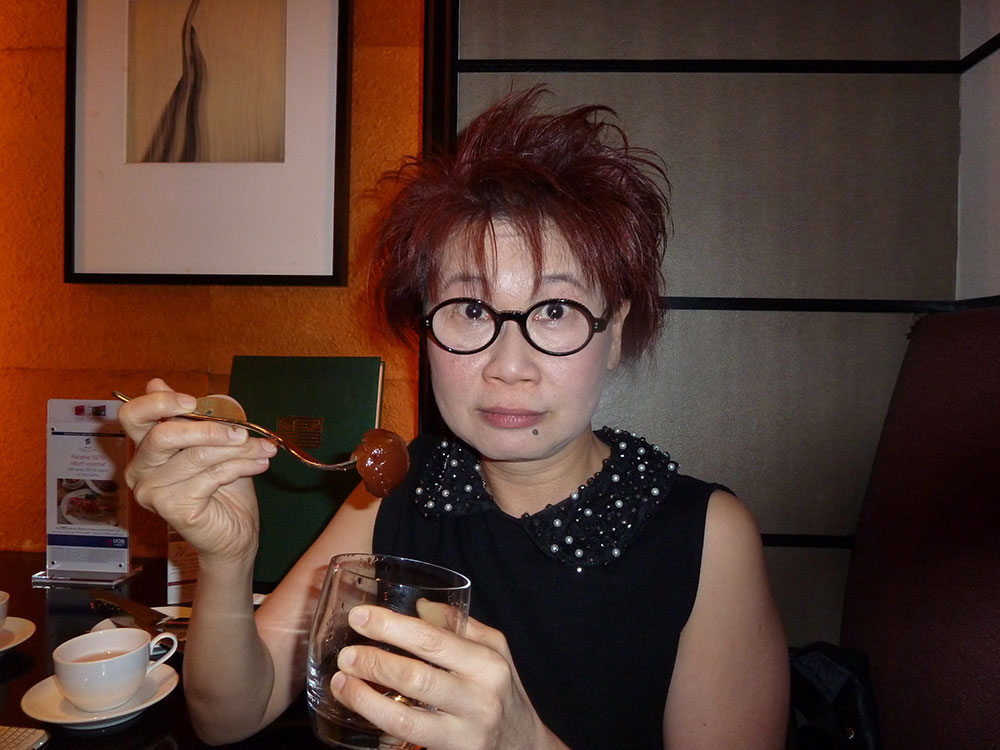 Chan has always been lean and spritely. Before treatment in 2014.
Chan has always been lean and spritely. Before treatment in 2014.
An unlikely candidate for lung cancer
Chan spent half a year getting her diagnosis right.
Pinpointing it was lung cancer was fraught with false leads and she was given treatments for less severe problems she was thought to have.
She went through a bevy of tests and scans, sought advice from different doctors, and even had her heart checked.
She was also given a steroid spray for her blocked nasal passages to help her breathe better.
Not that overlooking her cancer was anyone’s fault.
She felt it was inconceivable that a woman her age, in a white-collar job, and with her clean-living lifestyle habits, could come down with late stage lung cancer, a condition that plagues chain smokers.
By all accounts, she shouldn’t have been a prime candidate.
Lung cancer prevalent among non-smokers in Singapore
In general, Stage 4 lung cancer indicates that the cancer has spread beyond its original location in the lung to other organs in the body, according to Dr Ng Quan Sing, a medical oncologist at the National Cancer Centre Singapore who is currently treating her.
About 70 per cent of patients diagnosed with NSCLC already have Stage 4 cancer.
”About 50 per cent of patients with NSCLC in Singapore have never smoked, compared to 10 to 15 per cent in the Western countries,” said Ng.
Why this is so, is not entirely clear.
However, what is known is that a significant proportion of patients with NSCLC in Singapore and other Asian countries have genetic mutations that drive the cancer.
Ng also said: “More studies are needed to develop lung cancer screening programmes that are specific to our Singapore population.”
Cancer symptoms, Ng explained, sometimes do not appear until the cancer is more advanced.
“Very often, the symptoms associated with lung cancer can be very innocuous, such as coughing and feeling tired, and are more likely to be caused by something other than lung cancer.”
“Regular medical check-ups with your family doctor are highly recommended in order to diagnose and manage any acute or chronic medical conditions,” Ng elaborated further.
Cancer in remission
Chan is now retired and turning 62 in 2021. Her cancer is in remission.
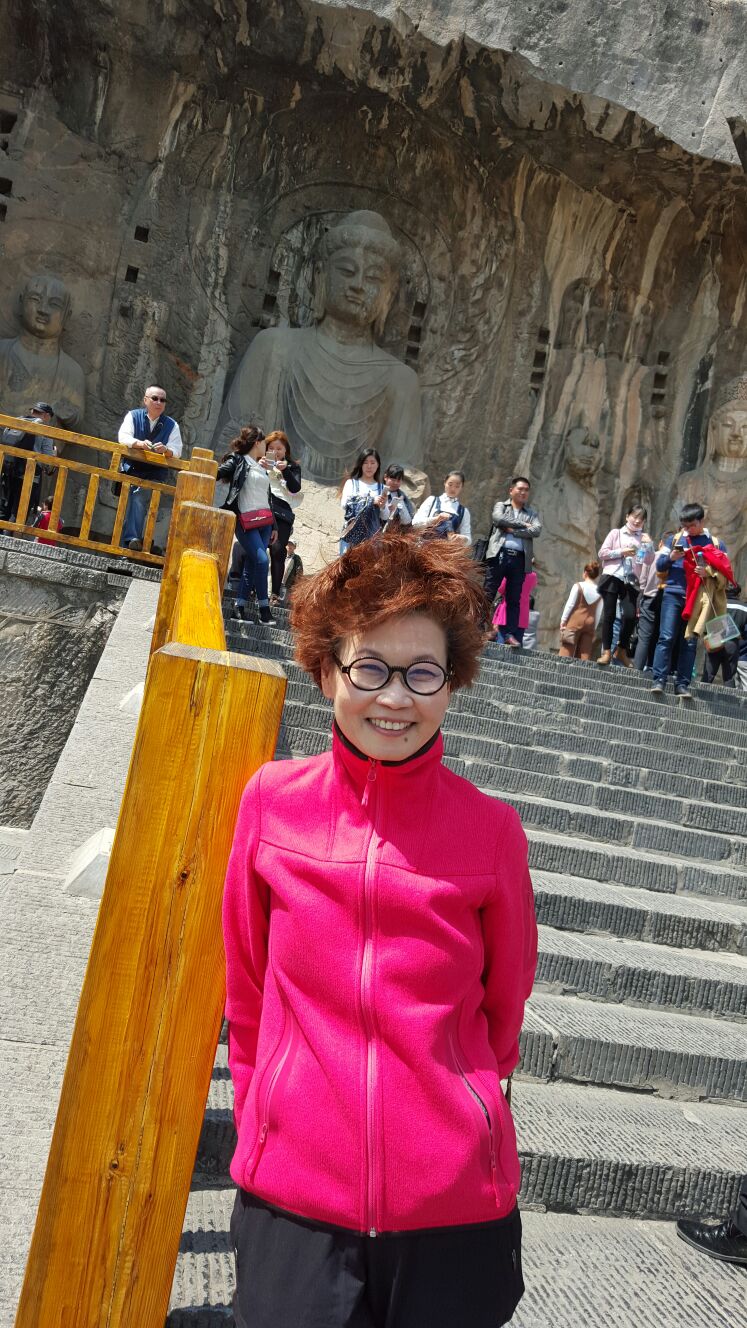 Travelling the world after treatment. Photo taken in Longmen Grottos in Henan, China.
Travelling the world after treatment. Photo taken in Longmen Grottos in Henan, China.
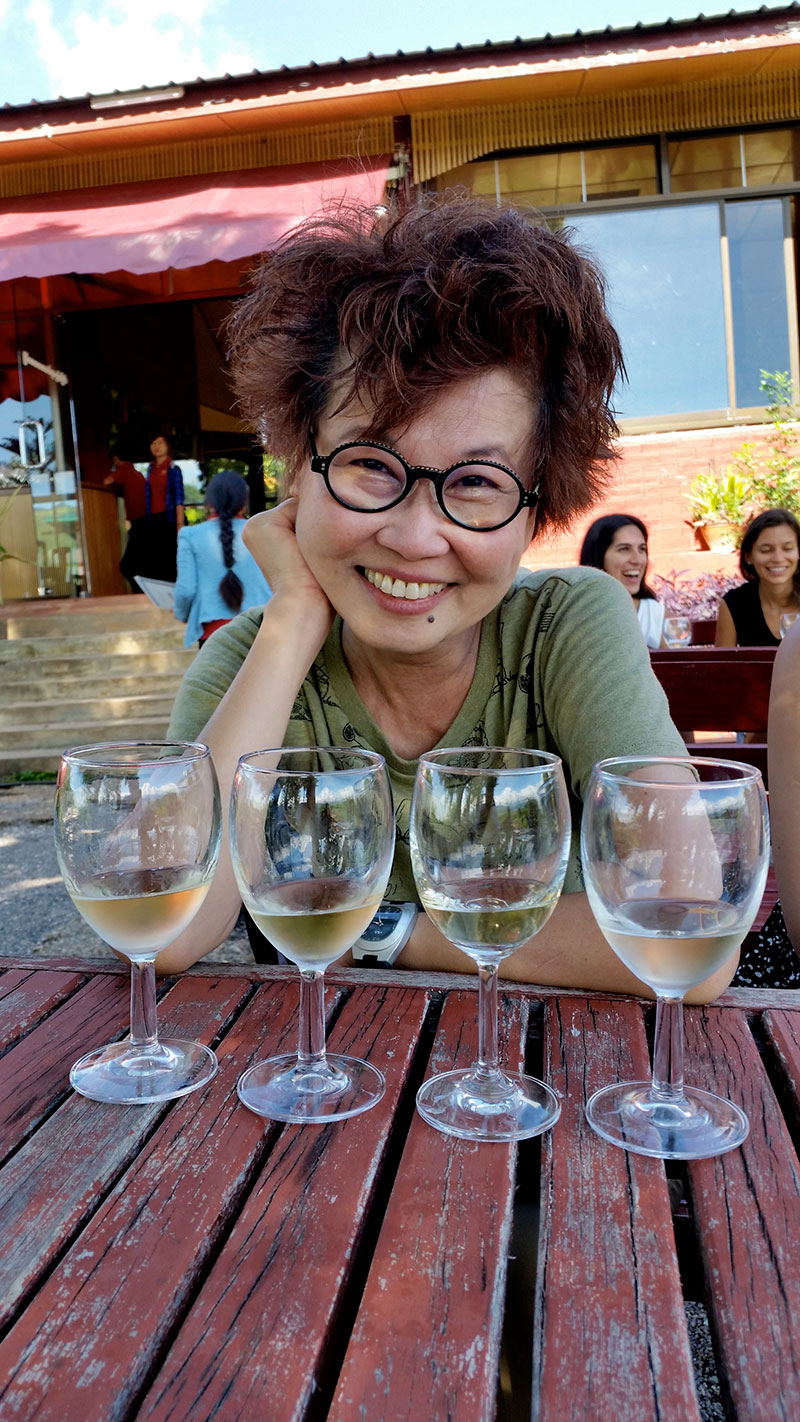 In June 2016, in Myanmar, following treatment. Pretending to drink wine.
In June 2016, in Myanmar, following treatment. Pretending to drink wine.
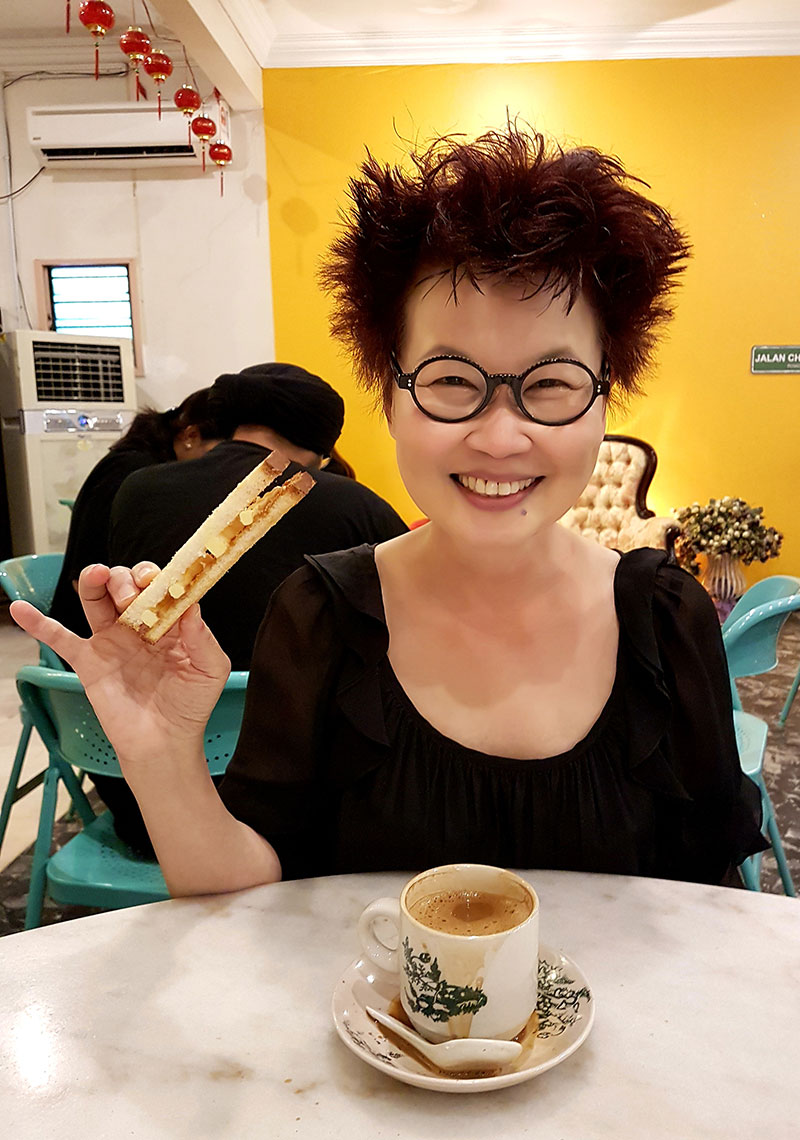 After her treatment, regaining her appetite for food.
After her treatment, regaining her appetite for food.
She was given targeted therapy and completed her chemotherapy in 2015, and before the Covid-19 pandemic struck, travelled the world following her brush with her mortality.
Chan credits Ng for her recovery and for being an excellent doctor and communicator who is always on hand to answer her queries.
Giving back
As a way of giving back to science and society, Chan has made a legacy gift via her will in support of lung cancer research at NCCS that would help future patients.
By her own admission, Chan said she is not the same person she once was as she is immunocompromised.
But her recovery has allowed her to speak candidly and with humour about coming down with cancer so suddenly and the things she did in its aftermath as a stoic pragmatist.
Mothership spoke to Chan about how she is dealing with having a second shot at life, where she thinks her cancer came from, how she is moving forward, and what others in her shoes can do.
Q&A
How did you feel before you were diagnosed with cancer?
Prior to that I was perfectly okay.
You didn’t feel sick at all?
I didn't feel sick but I realised something was amiss when I became breathless climbing up the stairs.
And that's just the overhead bridge steps, which is like, 18 steps, and then you have a landing, and then you are out of breath.
I went to see a doctor a few days later.
How long did it take before you were diagnosed with cancer?
Very long.
I saw the doctor at the end of May 2014. I already had an x-ray of my lungs, which were clear, and I brought along the negatives to my next medical check.
Then they thought there was something wrong with my heart.
And I went to the National Heart Centre Singapore, and they put me on the treadmill and made me run despite the fact that I was breathless.
The results said my heart was okay.
And then the doctor checked my nasal passages and said they were blocked.
But I could taste and smell and my nasal passages didn’t feel blocked.
I was given a steroid spray and was on to my third bottle.
By this time, I had seen a few doctors. And this doctor said something was not right and ordered for an x-ray.
This time the cancer tumour could be seen.
Do you recall what was the first thing that you asked your doctor intuitively when you were given your cancer diagnosis?
How long do I have to live? That was really the first thing I asked him, and I already knew the answer actually, because it was on the website.
But what I liked about his answer, which I didn't appreciate at that time, was that he said that I should handle it one day at a time.
So, were you told by your doctors how the cancer came to be since you're a non-smoker? Did the doctors try to isolate any sort of factors?
They actually told me they don’t know.
As far as the science is concerned, they are aware that middle-aged, mongoloid women are prone to getting non-small cell lung cancer.
Even if you google this, that is what it says, but they do not know the reason why.
Do you think your cancer is hereditary?
I would think it's possible because my dad, his sister, my grandfather and my cousin have all passed away due to cancer. Furthermore, I don't work in a factory where I have to breathe in bad air, and I don't smoke or drink. I live a pretty healthy life in the sense that I sleep early and exercise.
What was the hardest part of your cancer fight?
The hardest part is that I love food and I really hate chemotherapy because it affects my taste buds. So everything tasted dreadful.
But you have to make yourself eat, because you need the nutrients.
I mean the fatigue and everything you can deal with it. Just go to sleep, you know?
And the other thing about cancer side effects is that different patients experience different side effects.
How did you continue working?
I worked completely from home. Even before Covid-19, I was working from home as the nature of my job allowed me to do that.
I was officially diagnosed in November 2014, and I continued to work for another half a year.
How was your social life? Did you still meet people?
Yes, I still met people because otherwise, I think, I will go mad. [Laughs]
How did you approach navigating all the information out there about cancer and becoming well-informed about it?
You should be sensible about which website you go to.
I personally like to visit the Mayo Clinic website, because I find it very clear and simple to understand.
I also had an open communication channel with my doctor.
What would you advise people who are diagnosed with cancer but are unsure about the science or treatment options?
They need to be comfortable with their doctor.
If you trust and respect your doctor, you will pay more attention to what he says.
You need to be sensible enough to question some of the information that people send to you. They just want to share information, but I think they over share sometimes.
For example, they will tell you, “Don't take beef”, which is a complete nonsense.
Beef is protein and it is something that you need. You need to replenish cells in your body.
So that's the thing, Keep a good relationship with your doctor and check with him if you have any queries.
Basically work with your doctor and that's it.
Did you feel down?
That does happen, but luckily not often. I have a group of friends. We have a group chat. So I can text them anything I want.
I mean, I might be feeling lousy. And it's fine. So, my friends will come back and say that, “Hey, I'm free today. Let's go out.”
So be proactive and reach out to others. Don't sit by and wait for everyone to call you
Do you consider yourself to have beaten cancer?
No, I won’t say that. For example, there are certain things that I cannot do such as climbing the staircases. . I'm serious because I become breathless.
Tell your young readers. You want to go to Machu Picchu? You better go while you are healthy.
Are you worried about a relapse or any kind of deterioration in your condition?
I have to accept it if it happens.
Right now, I am on oral chemo. And I'm already using the most advanced type of medicine.
So, if the medication that I'm taking is no longer effective, then what’s next?
But you will cross that bridge when you get there, because right now, you really don't know how things will go.
And if there is something that makes me uncomfortable, it is that I know that 30 per cent of people with lung cancer will end up with a brain tumour.
I really hate the thought of it.
Did you suffer any side effects?
It was my hairdresser who told me that a lot of customers who have gone through chemo will experience changes to their hair texture.
Those with curly hair will have straight hair, and those with straight hair will end up with curly hair.
My hairdresser told me she could see some of my follicles coming up and they were curly.
So I asked my doctor, “Do you know why this is happening?”, and he said they are aware but do not have an explanation for it.
And, of course, the best part was, he kind of deadpanned, “But I don't advise hair growth through chemotherapy.”
Do you have any word of advice for people, especially family members who are living with someone who has cancer?
This is a difficult question to answer because it depends on the person's makeup.
I live alone, you know, I went through my entire chemotherapy alone. So, basically I'm extremely independent.
But there are some people who will be, you know, seeing the best doctor and having mates and what have you around, and spend the whole day saying that “I'm gonna die, I'm gonna die”.
The patient needs to help himself or herself to survive cancer.
What message do you have for people who have cancer but never expected cancer to happen to them?
Just get on with it, because there’s no point going through the “Why me?”, anger and denial process.
It is a complete waste of time because the cancer is not going to go away. So you might as well deal with it.
How did you react to people sending you information about unproven cancer treatments such as consuming soursop leaves?
Ha ha ha. I get ludicrous things like that.
Really, I mean you get links from people telling you that in the evening you shouldn't take cold water or ice cream, because everything with fats will congeal in your stomach, and then it will go rancid, and then my eyeballs fall out.
Do you and your doctor talk about such things?
I will say, “Doctor. I received this information about avoiding beef in my diet as I have cancer, and I totally disagree with it.”
He will tell me that he wants me to live a life as normal as possible although some dietary restrictions may apply. There are only three things that he tells me that I cannot eat because the compounds in them interact with my medication.
And the only other thing that I'm definitely not allowed to eat is raw food, because my immune system is impaired.
I had a negotiation with my doctor about beef. He wants me to have it well done, but I refuse.
So the compromise is medium rare, but the beef must be prepared without it being bloody.
This article is brought to you by Pfizer for World Cancer Day.
If you like what you read, follow us on Facebook, Instagram, Twitter and Telegram to get the latest updates.
